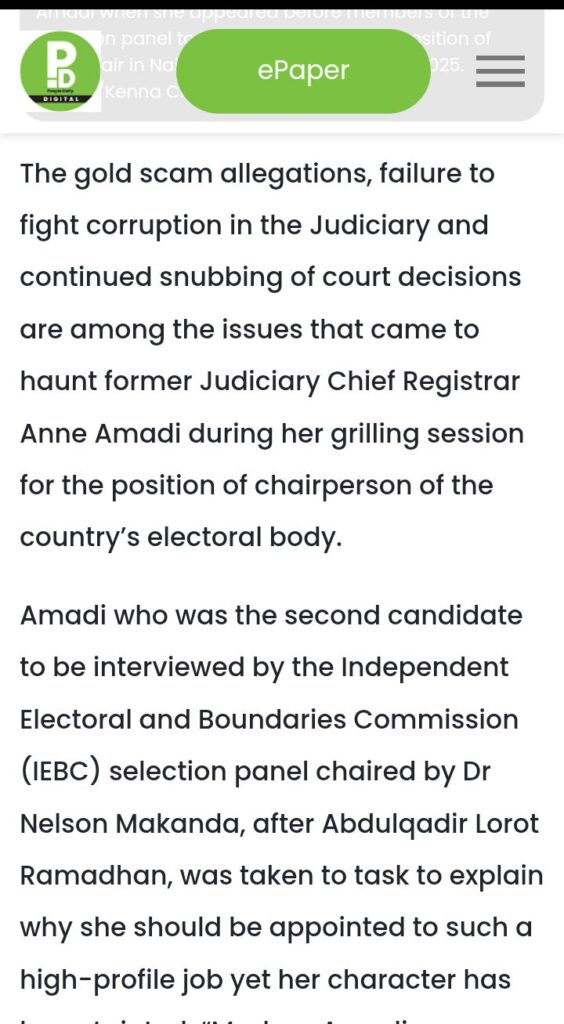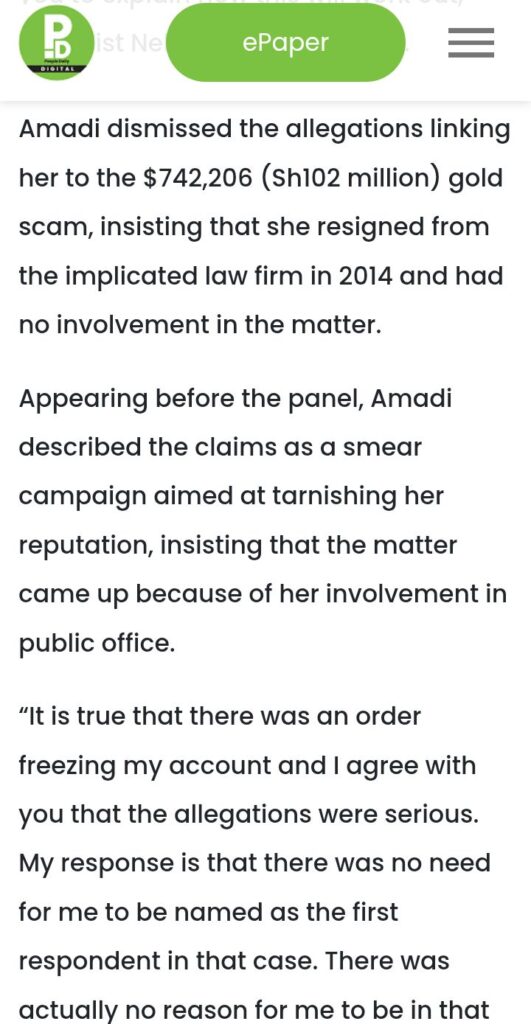According to a report by People’s Daily, Anne Amadi’s bid to become the chairperson of the country’s electoral body has been overshadowed by serious allegations that have tainted her reputation. Her past controversies, including the gold scam allegations, her failure to fight corruption in the Judiciary, and her disregard for court decisions, were at the center of her grilling session before the IEBC selection panel.
The panel questioned whether she was fit to hold such a critical position, given the unresolved questions surrounding her integrity. Amadi was the second candidate to be interviewed after Abdulqadir Lorot Ramadhan.

During her session, she was confronted about a High Court order that froze her accounts due to allegations of involvement in a gold scam worth Sh100 million. Panelist Nelson Bore directly challenged her, asking how she could be entrusted with leading the electoral commission while carrying such baggage.
In response, Amadi distanced herself from the scandal, stating that she resigned from the implicated law firm in 2014 and had no connection to the matter. She insisted that the accusations were part of a smear campaign designed to tarnish her name because of her work in public service.
Amadi acknowledged that her bank accounts had been frozen but claimed that the court later cleared her. She argued that she had no knowledge of gold dealings and that her name was unnecessarily dragged into the case.

Despite her defense, questions remain about how such serious allegations reached the level of freezing her accounts if she had no involvement. The case, filed by Briton Demetrios Bradshaw and his company, Bruton Gold Trading LLC, accused Amadi’s law firm, Amadi and Associates, of orchestrating the fraud.
The court not only froze her assets but also extended the orders to her son, Brain Amadi, who runs the firm. Although High Court Judge Alfred Mabeya later lifted the freeze, stating that there was no evidence linking her to the scam, the case continues to raise doubts about her credibility.
Beyond the gold scam, Amadi faced tough questions regarding her record in fighting corruption within the Judiciary. Critics pointed out that under her tenure as Chief Registrar, complaints of bribery, favoritism in promotions, and improper influence plagued the Judiciary.
When asked about these issues, she admitted that complaints were common but dismissed them as lacking sufficient evidence. This response did little to assure those who believe that the Judiciary under her watch failed to deal with corruption effectively.

Amadi also faced criticism over her handling of court decisions. The panel questioned whether she had always respected court rulings, a key trait required for the IEBC chairperson role. In her defense, she insisted that she had always followed judicial decisions, but the selection panel remained skeptical.
Given the Judiciary’s history of controversial rulings and allegations of political interference, her ability to uphold electoral integrity remains in question.Despite the tough questions, Amadi tried to highlight her experience, arguing that she was well suited for the high-pressure role of IEBC chairperson.
She pointed to her involvement in inaugurating two presidents and her time at the Judicial Service Commission (JSC), where she claimed to have played a role in disciplining magistrates.
However, her tenure at JSC is also remembered for internal wrangles and allegations of bias in appointments and promotions.Amadi proposed reducing the number of polling stations from 46,232 to 22,000 as a way to cut costs.
She argued that this would reduce expenses on security, transportation, and staff. However, such a drastic reduction raises concerns about voter accessibility and efficiency in elections.
Critics argue that limiting polling stations could lead to congestion, long queues, and disenfranchisement, particularly in rural areas.


